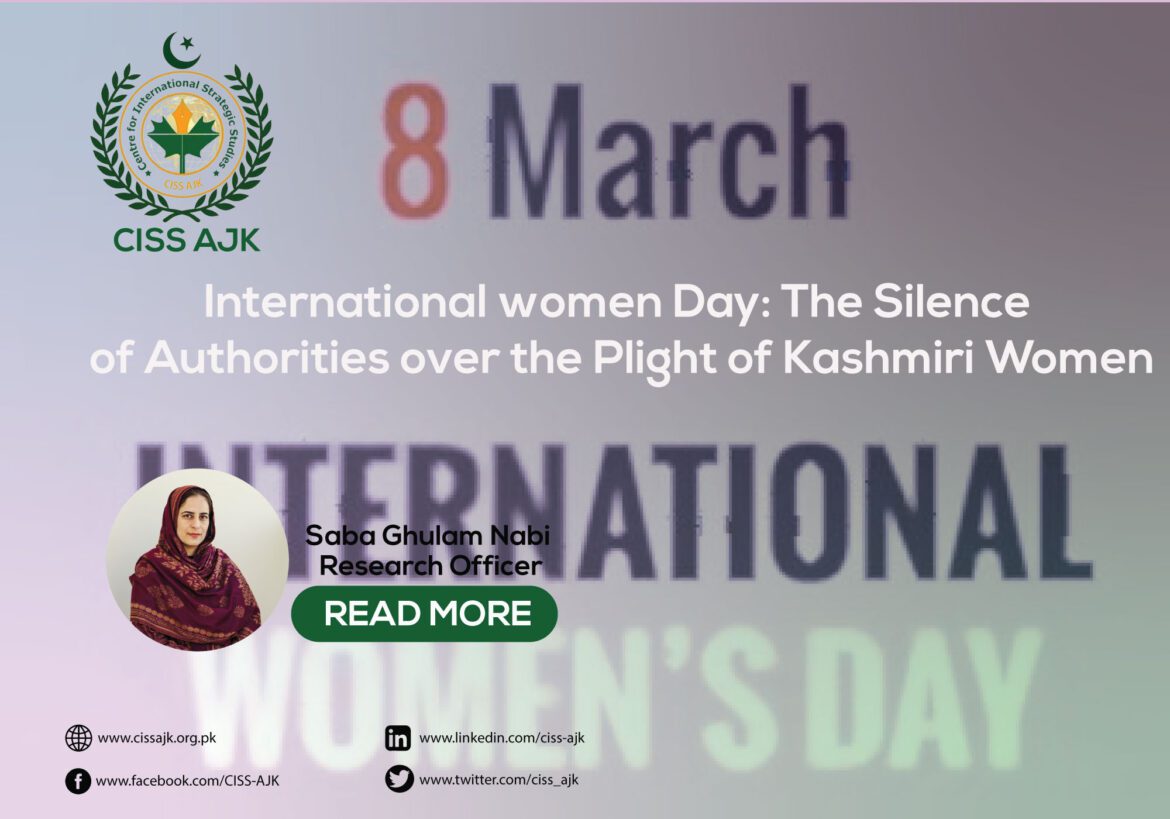International women day is celebrated annually on 8th of March as global day focussing on the women’s rights movement, brining attention to issues such as gender equality, reproductive rights, and violence and abuse against women.International Women’s Day is commemorated in a variety of ways worldwide; it is a public holiday in several countries, and observed socially or locally in others to celebrate and promote the achievements of women. The UN observes the holiday in connection with a particular issue, campaign, or theme in women’s rights. But the women of Indian Illegal occupied Kashmir (IIOK) who daily pen down the new chapter of history has no affiliation to celebrate this day. Kashmiri women have been the direct and indirect receiving ends of the conflict with layer and complex consequences. Conflict affects and complicates social relationship for them. Kashmiri women are the biggest victims of this inhumane siege. A Belarusian Nobel Laureate writer Svetlana Alexievich, in her effort to “humanize history” wrote a famous book “Unwomanly Faces of War”. The writer penned down the voices of women in World War II. She writes in her book; “Whatever women talk about, the thought is constantly present in them: war is first of all murder, and then hard work. In the center there is always this, how unbearable and unthinkable it is to die. And how much more unbearable and unthinkable it is to kill, because a woman gives life. Bears it in her for a long time, nurses it. I understood that it is more difficult for women to kill.” It is definitely difficult for women to kill, but it is far more difficult to live with the “loved ones killed in war”, bearing their loss, adopting their role and surviving with other conflict related pains. The women face the conflict in its worst form. ICRC, an article about “Women and War” starts with the phrase “Men Make war; women live with consequences”. In every conflict the main sufferer are the women. It is woman who loses her loved ones, who is used as war weapon and faces the rape and lives with this existential trauma”. Kashmir conflict is not a different story. The stories of victimization of women are heinous and deliberately “unheard”. Kashmir Conflict after 1989 uprising has gobbled up 100000 lives and left more than 10,000 people disappeared. Not only losing the loved ones in insurgency has traumatized the lives of women in Kashmir but there is an existential fear of losing more of their family members to the conflict. Indian Army has deliberately used women of Kashmir as a weapon of war. There were many reports of massive gang rapes in IIOJK during insurgency. Kunan Poshpora is one of such examples whose victims are still demanding justice after thirty years of the incident. But their repeated appeals still remain unheard and unregistered. Half widows of disappeared persons are still living in a hope to get their loved ones back one day. But India’s self-acclaimed democracy and secularism failed to protect women in Kashmir. International Law recognises the impact of conflict on women and entails certain provisions for the protection of women. UNSC in its resolution 1325 (2000), acknowledged the disproportionate and unique impact of armed conflict on women and girls. It calls for the adoption of a gender perspective to consider the special needs of women and girls during conflict, repatriation and resettlement, rehabilitation, reintegration, and post-conflict reconstruction. Resolution 1325 was the first formal and legal document from the Security Council that required parties in a conflict to prevent violations of women’s rights, to support women’s participation in peace negotiations and in post-conflict reconstruction, and to protect women and girls from wartime sexual violence. It was also the first UNSC resolution to specifically mention the impact of conflict on women. International Humanitarian Law, which demands the protection of civilian during armed conflict also emphasis on the protection of women. In addition to the general protection from which all civilians benefit, Article 27 of additional protocol I says “women shall be especially protected against any attack on their honour, in particular against rape, enforced prostitution or any form of indecent assault”. Protocol II completes and develops this provision. Its Article 4 expressly forbids “outrages upon personal dignity, in particular humiliating and degrading treatment, rape, enforced prostitution and any form of indecent assault.” But despite these reassurances of protection in IHL and International Law, India is perpetuating the worst forms of assault against women in Kashmir for last 75 years, but international community offers a “deaf year” to it. The silence around the world is deafening. “It is unfortunate that the United Nations has not done anything except passed resolutions to solve the oldest dispute lying on its agenda,” international community is not mobilised and doing nothing to reduce the suffering of people of occupied valley.” India calls herself the largest democracy, and is to host G20 summits 2023.But the situation of human rights in IIOJK is getting worst with every passing day. International community must raise the questions about the plight of women and the situation of human rights in IIOJK.
International women Day: The Silence of Authorities over the Plight of Kashmiri Women
787



